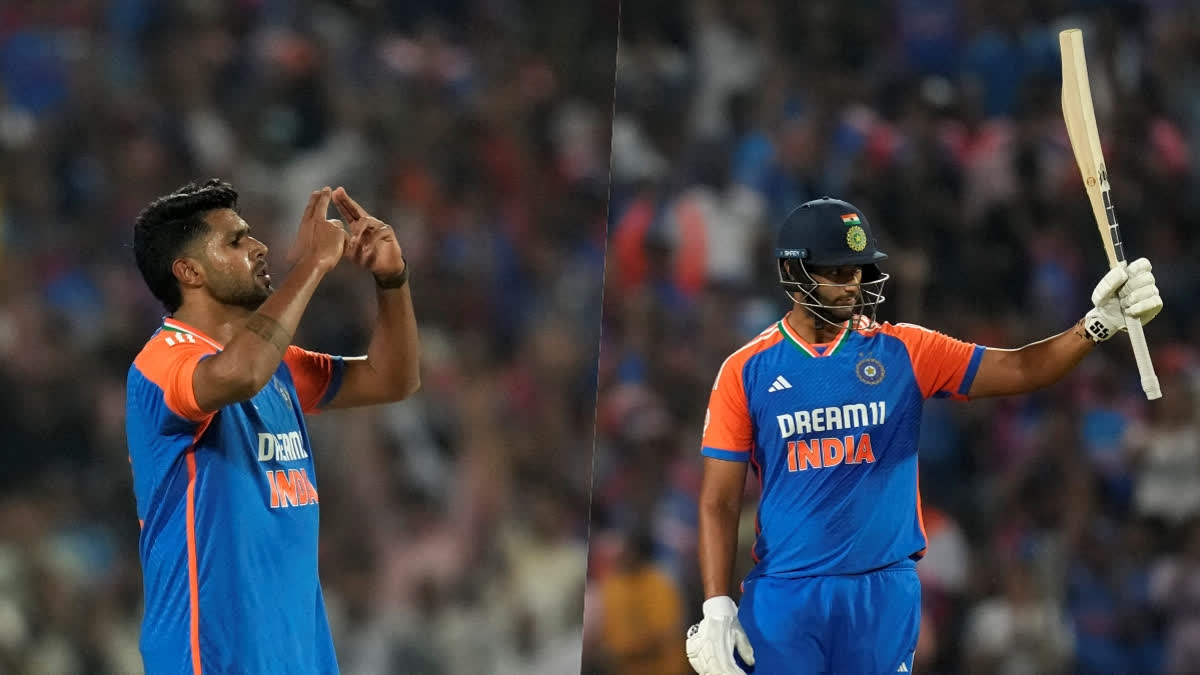Hyderabad: Specialist Pacer Harshit Rana was named as a concussion substitute for batting all-rounder Shivam Dube during the fourth T20I between India and England at the Maharashtra Cricket Association (MCA) Stadium in Pune on Friday, January 31.
Shivam Dube, who returned to India's squad after Nitish Kumar Reddy sustained a side strain and was ruled out of the ongoing T20I series against England, smashed his fourth fifty of his career and stitched a crucial 87-run partnership with Hardik Pandya to help India post compatible 182-run target after thee host were reduced at 12/3 at one stage. During the last over of India's innings bowled by Jamie Overton, Dube got hit on the helmet.
Chopped 🔛
— BCCI (@BCCI) January 31, 2025
Wicket No. 3⃣ for Harshit Rana! 👌 👌#TeamIndia a wicket away from a win!
Follow The Match ▶️ https://t.co/pUkyQwxOA3#INDvENG | @IDFCFIRSTBank pic.twitter.com/yEf4COEGA7
Dube then didn't take the field in the second innings as he was suffering from concussion symptoms. After the match referee's approval, Harshit Rana stepped onto the field as a concussion substitute for Shivam Dube. Rana, who made his T20I debut, returned three wickets for 33 runs in his four overs and played a vital role in India’s defence of 182 runs and India won the match by 15 runs.
For his vital half-century, Shivam Dube bagged the Player of the Match Award in the fourth #INDvENG T20I. 👍 👍
— BCCI (@BCCI) January 31, 2025
Scorecard ▶️ https://t.co/pUkyQwxOA3#TeamIndia | @IDFCFIRSTBank pic.twitter.com/rMbxYog0mO
English commentators Kevin Pietersen and Nick Knight, who were on air at the time, also raised concerns about the substitution. England skipper Jos Buttler also seemed unhappy with this substitution since Dube, a batting all-rounder, was replaced by Harshit, a specialist pacer despite Ramandeep Singh, who is also a batting all-rounder, being on the bench.
"It is not a like-for-like replacement. We don't agree with that," Buttler said in the post-match press conference. "Either Shivam Dube has put on about 25 mph with the ball or Harshit's really improved his batting. It's part of the game and we really should have gone on to win the match, but we disagree with the decision."
"There was no consultation [with us]. That's something I was thinking as I came out to bat - who is Harshit on for? They said he is a concussion replacement, which I obviously disagreed with. It is not a like-for-like replacement. They said that the match referee had made the decision. We had no say in it or any part of it. But we'll ask Javagal [Srinath] some questions just to get some clarity around it" Buttler added.
The change sparked a debate over the exact rules related to the change and what the term ‘Like-for-like replacement’ signifies in the International Cricket Council’s (ICC) playing conditions.
The rule 1.2.7 of ICC’s Men’s T20I playing guidelines deals with concussion substitutes. According to the rule, "the ICC Match Referee should ordinarily approve a Concussion Replacement Request if the replacement is a like-for-like player whose inclusion will not excessively advantage his/her team for the remainder of the match."
Sub-sections, 1.2.7.4 and 1.2.7.5, add, "In assessing whether the nominated Concussion Replacement should be considered a like-for-like player, the ICC Match Referee should consider the likely role the concussed player would have played during the remainder of the match and the normal role that would be performed by the nominated Concussion Replacement."
"If the ICC Match Referee believes that the inclusion of the nominated Concussion Replacement when performing their normal role, would excessively advantage their team, the ICC Match Referee may impose such conditions upon the identity and involvement of the Concussion Replacement as he/she sees fit, in line with the overriding objective of facilitating a like-for-like replacement for the concussed player."
ICC Playing Conditions - Concussion Substitute
1.2.7.1 If a player sustains a concussion or suspected concussion as a result of a head or neck injury during the relevant match, a Concussion Replacement may be permitted in the following circumstances:
Harshit Rana was named as a concussion substitute for Shivam Dube during the fourth T20I between India and England at the Maharashtra Cricket Association Stadium in Pune on Friday.
Rana returned three wickets for 33 runs in his four overs and played a vital role in India’s defence of 182 runs. India won the match by 15 runs.
According to the broadcasters, English captain Jos Buttler was unhappy with this substitution since Dube, an all-rounder, was replaced by Harshit, primarily a pacer.
The change sparked a debate over the exact rules related to the change and what the term ‘Like-for-like replacement’ signifies in the International Cricket Council’s (ICC) playing conditions.
The rule 1.2.7 of ICC’s Men’s T20I playing guidelines deals with concussion substitutes.
According to the rule,” The ICC Match Referee should ordinarily approve a Concussion Replacement Request if the replacement is a like-for-like player whose inclusion will not excessively advantage his/her team for the remainder of the match.”
Sub-sections, 1.2.7.4 and 1.2.7.5, add, “In assessing whether the nominated Concussion Replacement should be considered a like-for-like player, the ICC Match Referee should consider the likely role the concussed player would have played during the remainder of the match and the normal role that would be performed by the nominated Concussion Replacement.
“If the ICC Match Referee believes that the inclusion of the nominated Concussion Replacement, when performing their normal role, would excessively advantage their team, the ICC Match Referee may impose such conditions upon the identity and involvement of the Concussion Replacement as he/she sees fit, in line with the overriding objective of facilitating a like-for-like replacement for the concussed player.”
ICC Playing Conditions - Concussion Substitute
1.2.7.1 If a player sustains a concussion or suspected concussion as a result of a head or neck injury during the course of the relevant match, a Concussion Replacement may be permitted in the following circumstances:
- 1.2.7.1.1 the head or neck injury must have been sustained during play and within the playing area described in clause 1.2.5.2 above;
- 1.2.7.1.2 A concussion or suspected concussion must have been formally diagnosed by the Team Medical Representative;
- 1.2.7.1.3 The team Medical Representative or Team Manager shall submit a Concussion Replacement Request to the ICC Match Referee on a standard form, which shall:
- 1.2.7.1.3.1 Identify the player who has sustained the concussion or suspected concussion;
- 1.2.7.1.3.2 Specify the incident in which the concussion or suspected concussion was sustained, including the time at which it occurred;
- 1.2.7.1.3.3 Confirm that, following an examination, the Team Medical Representative believes or suspects that the player has sustained a concussion as a result of the incident specified in clause 1.2.7.1.3.2 above;
- 1.2.7.1.3.4 Identify the requested Concussion Replacement, who shall be a like-for-like replacement for the player who has sustained the concussion or suspected concussion.
- 1.2.7.2 The Concussion Replacement Request must be submitted as soon as possible after the incident specified in clause - 1.2.7.1.3.2 if a Concussion Replacement is to be permitted.
- 1.2.7.3 The ICC Match Referee should ordinarily approve a Concussion Replacement Request if the replacement is a like-for-like player whose inclusion will not excessively advantage his/her team for the remainder of the match.
- 1.2.7.4 In assessing whether the nominated Concussion Replacement should be considered a like-for-like player, the ICC Match Referee should consider the likely role the concussed player would have played during the remainder of the match and the normal role that would be performed by the nominated Concussion Replacement.
- 1.2.7.5 If the ICC Match Referee believes that the inclusion of the nominated Concussion Replacement when performing their normal role, would excessively advantage their team, the ICC Match Referee may impose such conditions upon the identity and involvement of the Concussion Replacement as he/she sees fit, in line with the overriding objective of facilitating a like-for-like replacement for the concussed player. For clarity, a concussion replacement will not be permitted to bowl during the innings and/or for the remainder of the match if the replaced player was suspended from bowling for any reason at the time they were replaced.
- 1.2.7.6 The ICC Match Referee may, in reviewing a Concussion Replacement Request made by clause
- 1.2.7.1.3, request any such further information as may be required to make the determination required under clauses 1.2.7.4 and 1.2.7.5.
- 1.2.7.7 The decision of the ICC Match Referee in relation to any Concussion Replacement Request shall be final and neither team shall have any right of appeal.
- 1.2.7.8 Once the Concussion Replacement has been approved by the ICC Match Referee, the replaced player shall play no further part in the match.
- 1.2.7.9 Both the Concussion Replacement and the replaced player shall be considered to have played in the match for records and statistical purposes.



